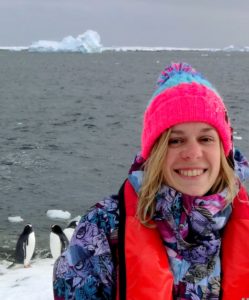 After achieving an engineering degree with a specialty in Water & Environment (Higher Engineering School of Limoges (ENSIL), France) and a MSc in marine mammal science (University of St Andrews, UK), I started a PhD in October 2016 within the Sound and Movement team under the supervision of Dr Mark Johnson (SMRU), Prof Peter Tyack (SMRU) and Dr Iain Staniland (BAS).
After achieving an engineering degree with a specialty in Water & Environment (Higher Engineering School of Limoges (ENSIL), France) and a MSc in marine mammal science (University of St Andrews, UK), I started a PhD in October 2016 within the Sound and Movement team under the supervision of Dr Mark Johnson (SMRU), Prof Peter Tyack (SMRU) and Dr Iain Staniland (BAS).
I am interested in multi-disciplinary projects that combine biological issues and engineering solutions; and the Dtag Lab offers a fantastic opportunity to formulate biological questions, to design and develop biologging devices that could help address them but also to deploy such devices and analyse the data.
As part of my PhD project, I am currently developing an innovative, miniature ‘sonar tag’ for wild southern elephant seals which will act as a miniature fisheries echosounder to sample the prey field around the animal and characterise predator-prey interactions. How animals find, select and capture prey are central themes in ecology; yet for many aquatic animals, such information remains difficult to obtain. Southern elephant seals are unique yet elusive animals that go for long foraging trips (lasting for several months), over thousands of kilometres, and routinely catch their prey at depths of 600 to 1000m. Despite the advances in biologging technology, what they encounter while at depth remains virtually unknown.
The device I am currently developing will emit sound waves at very high frequency (1.5 MHz) and record the returning echoes from prey within 5m in front of the animal. It will simultaneously record information on the seal’s behaviour such as its movements (using accelerometer and magnetometer) and its position (in the water column – depth sensor, and in geographical space – GPS sensor). Using this combination of sensors, I hope to understand what type of organisms they encounter when foraging, which ones they choose to feed on and how they move to catch it.
Contact: [email protected]